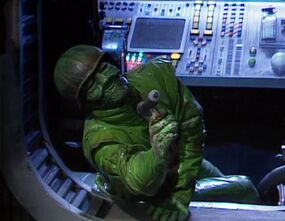Chimeron: Difference between revisions
(detail) |
m (Spacing issues) |
||
| (112 intermediate revisions by 25 users not shown) | |||
| Line 1: | Line 1: | ||
{{Infobox Species | {{Infobox Species | ||
|image = The Chimerons.jpg | |||
|image= | |type = [[Humanoid]] | ||
|type = | |aka = | ||
|aka= | |||
|affiliation = | |affiliation = | ||
|origin = | |origin = [[Chumeria]] | ||
| | |only = Delta and the Bannermen (TV story) | ||
|individuals = {{csl|[[Delta]]|[[Chimeron princess]]|[[Billy (Delta and the Bannermen)|Billy]]|}} | |||
| | |||
}} | }} | ||
The '''Chimeron''' | The '''Chimeron''' (pronounced shimmer-on) were a race of insect-behavioured [[humanoid]]s native to [[Chumeria]], commonly known as "the garden [[planet]] of [[N-Space|the universe]]". | ||
They showed vast differences in appearance between genders and went through a complex road to maturity. The Chimerons were nearly made extinct by the [[Bannermen]]. | |||
== Biology == | |||
=== Life cycle === | |||
Chimerons hatched from large grey [[egg]]s on a [[brood planet]] and started as [[green]], wrinkly infants. Though males kept this appearance throughout their life, the [[queen]]s of the species had a slightly different development. | |||
[[File:Chimeron child.jpg|left|thumb|A newborn Chimeron. ([[TV]]: ''[[Delta and the Bannermen (TV story)|Delta and the Bannermen]]'')]] | |||
[[Category: | In order to properly develop, young queens were fed [[Chimeron jelly]] until they were fully grown. Their coming into adulthood was marked by the [[Singing time]]. | ||
In the first few hours after birth, Chimerons rapidly grew and became more [[human]] looking, developing hair and other more distinct facial features and began to lose their wrinkles. | |||
Adult queen Chimerons looked similar to [[human]] females with slightly green skin and grey patches behind the ears. ([[TV]]: ''[[Delta and the Bannermen (TV story)|Delta and the Bannermen]]'') | |||
=== Abilities === | |||
Chimeron queens also developed a strong singing voice, partly as communication, and partly as a vocal means of defence. | |||
Once they reached the ''Singing Time'', they perfected their defensive songs and grew to near adult size. Adult queens had the ability to detect high frequencies using the grey patches behind their ears. ([[TV]]: ''[[Delta and the Bannermen (TV story)|Delta and the Bannermen]]'') | |||
[[File:Chimeron gun.jpg|right|thumb|A Chimeron gun. ([[TV]]: ''[[Delta and the Bannermen (TV story)|Delta and the Bannermen]]'')]] | |||
== Technology == | |||
Chimerons had high level weaponry and spaceships. A portable incubator housed a Chimeron egg until it hatched. | |||
Chimeron produced Chimeron jelly, though whether this was a natural or manufactured item is unknown. The jelly was capable of converting other species (humans, at least) into Chimerons. The side effects of this process were unknown. ([[TV]]: ''[[Delta and the Bannermen (TV story)|Delta and the Bannermen]]'') | |||
== History == | |||
[[File:Male Chimeron.jpg|left|thumb|An adult male Chimeron. ([[TV]]: ''[[Delta and the Bannermen (TV story)|Delta and the Bannermen]]'')]] | |||
The Chimerons were nearly wiped out by the [[Bannermen]], but the last queen, [[Delta]], was able to escape with an egg. The egg hatched on [[Earth]], and with the assistance of the [[Seventh Doctor]], Delta and her daughter were able to escape annihilation by the [[Bannermen]]. | |||
They left Earth along with [[Billy (Delta and the Bannermen)|Billy]], a [[human]] whom Delta had fallen in love with. He took some Chimeron jelly to become a Chimeron; without him the species could not continue. ([[TV]]: ''[[Delta and the Bannermen (TV story)|Delta and the Bannermen]]'') | |||
== Behind the scenes == | |||
The script of ''Delta'' describes them as "soft [and] puma-like" and notes that they resemble "puffy Michelin Men in iridescent green suits, segmented like insects, silvery green skin. Their hair is silver and they have startling blue eyes." ([[INFO]]: ''[[Delta and the Bannermen (TV story)|Delta and the Bannermen]]'') | |||
[[Category:Humanoid species]] | |||
[[Category:Binary-sex species]] | |||
Latest revision as of 09:52, 18 March 2023
The Chimeron (pronounced shimmer-on) were a race of insect-behavioured humanoids native to Chumeria, commonly known as "the garden planet of the universe".
They showed vast differences in appearance between genders and went through a complex road to maturity. The Chimerons were nearly made extinct by the Bannermen.
Biology[[edit] | [edit source]]
Life cycle[[edit] | [edit source]]
Chimerons hatched from large grey eggs on a brood planet and started as green, wrinkly infants. Though males kept this appearance throughout their life, the queens of the species had a slightly different development.
In order to properly develop, young queens were fed Chimeron jelly until they were fully grown. Their coming into adulthood was marked by the Singing time.
In the first few hours after birth, Chimerons rapidly grew and became more human looking, developing hair and other more distinct facial features and began to lose their wrinkles.
Adult queen Chimerons looked similar to human females with slightly green skin and grey patches behind the ears. (TV: Delta and the Bannermen)
Abilities[[edit] | [edit source]]
Chimeron queens also developed a strong singing voice, partly as communication, and partly as a vocal means of defence.
Once they reached the Singing Time, they perfected their defensive songs and grew to near adult size. Adult queens had the ability to detect high frequencies using the grey patches behind their ears. (TV: Delta and the Bannermen)
Technology[[edit] | [edit source]]
Chimerons had high level weaponry and spaceships. A portable incubator housed a Chimeron egg until it hatched.
Chimeron produced Chimeron jelly, though whether this was a natural or manufactured item is unknown. The jelly was capable of converting other species (humans, at least) into Chimerons. The side effects of this process were unknown. (TV: Delta and the Bannermen)
History[[edit] | [edit source]]
The Chimerons were nearly wiped out by the Bannermen, but the last queen, Delta, was able to escape with an egg. The egg hatched on Earth, and with the assistance of the Seventh Doctor, Delta and her daughter were able to escape annihilation by the Bannermen.
They left Earth along with Billy, a human whom Delta had fallen in love with. He took some Chimeron jelly to become a Chimeron; without him the species could not continue. (TV: Delta and the Bannermen)
Behind the scenes[[edit] | [edit source]]
The script of Delta describes them as "soft [and] puma-like" and notes that they resemble "puffy Michelin Men in iridescent green suits, segmented like insects, silvery green skin. Their hair is silver and they have startling blue eyes." (INFO: Delta and the Bannermen)



